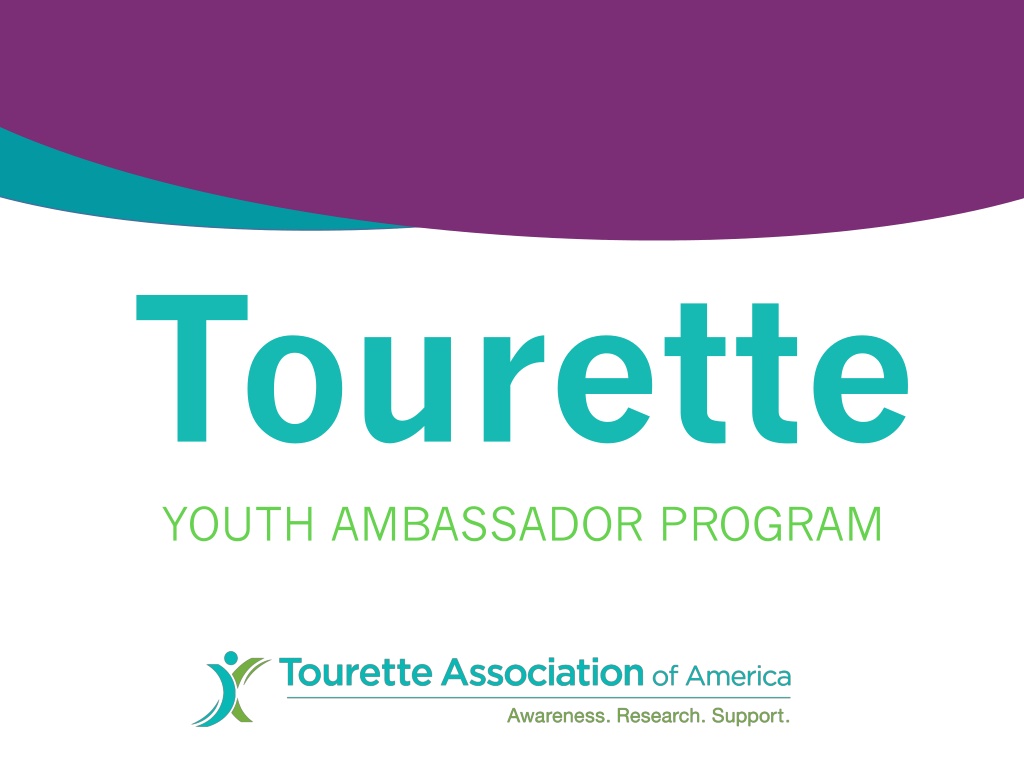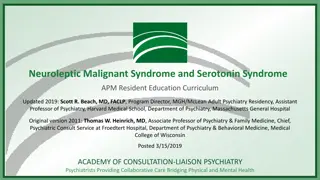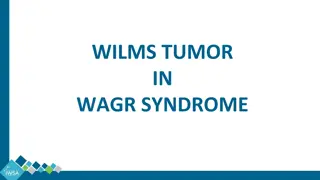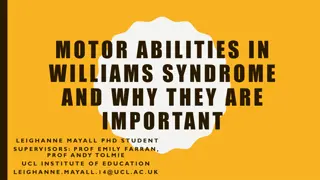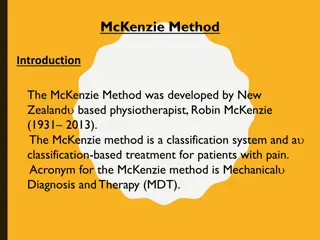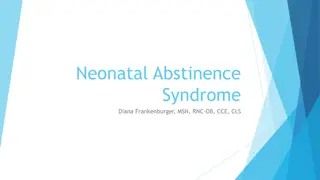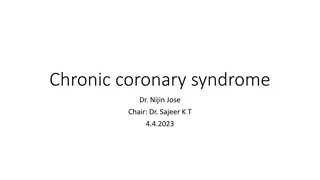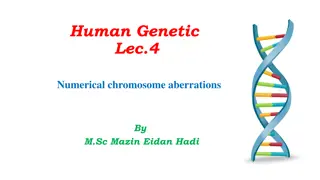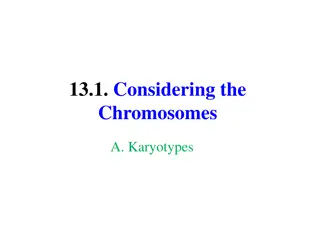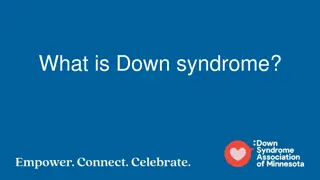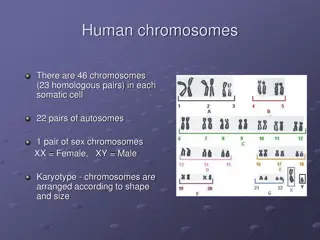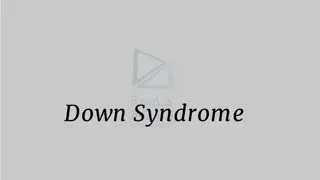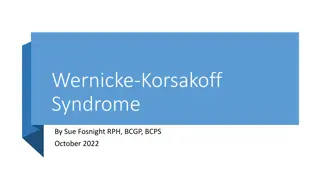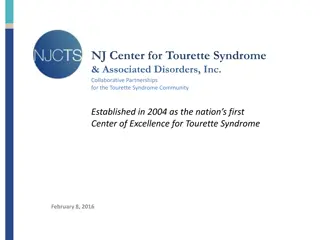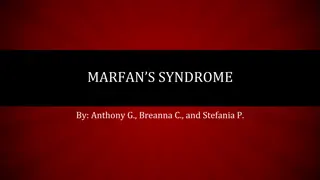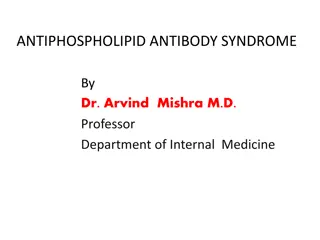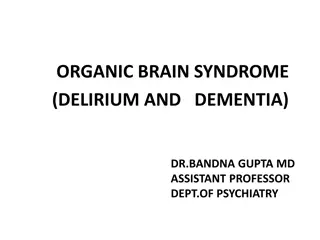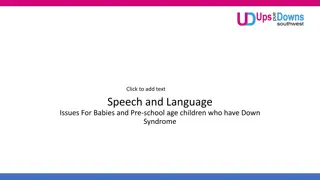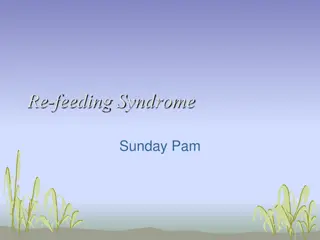Understanding Tourette Syndrome: Interactive Educational Presentation
Introduce the Tourette Youth Ambassador Program by educating children about Tourette Syndrome in a friendly and interactive manner. Address common misconceptions, explain TS as a medical condition, and promote understanding and empathy towards those with TS. Encourage positive interactions and engagement to foster a supportive environment.
Download Presentation

Please find below an Image/Link to download the presentation.
The content on the website is provided AS IS for your information and personal use only. It may not be sold, licensed, or shared on other websites without obtaining consent from the author. Download presentation by click this link. If you encounter any issues during the download, it is possible that the publisher has removed the file from their server.
E N D
Presentation Transcript
Tourette YOUTH AMBASSADOR PROGRAM
Start out by introducing yourself. If you are working with a small group ask each child his/her name so that they begin to feel comfortable talking with you. Inform the group that you are from an organization called the Tourette Association and you are here to talk about Tourette. 1
Explain that Tourette is also called Tourette Syndrome and/or Tourette Disorder. People also call it TS or TD. Now ask the children if anyone has ever heard of Tourette, Tourette Syndrome, Tourette Disorder, TS or TD. If children have heard about it let them explain what they know. Be prepared to hear answers that are not factual, especially things they have seen or heard in the media. If answers should come up that are not factual, explain that is how Tourette is shown in the media, but today they are going to learn what Tourette really is. If someone brings up coprolalia explain how uncommon that actually is. It occurs in less than 10% of people diagnosed with TS. State that the media just finds it amusing and that is why it is commonly shown. And state that you will discuss it more in a few minutes. Remember to give positive reinforcement, even if an answer is wrong. You want to make the kids feel confident in contributing to the conversation. This presentation is best when it is interactive! 2
Tourette is a medical condition
Tell the group that Tourette is a medical condition. And say now you are going to switch topics for a second. Ask the group what other medical conditions they know about. Hopefully the group will bring these up but if they don't, bring up some common medical conditions that the children probably have heard of. (Examples: asthma, juvenile diabetes). Ask them if they know anyone who has these or know anything about these medical disorders. Most children will know about asthma so lean the conversation towards that. Ask the group if they would ever make fun of someone for having to use an inhaler, or for having an asthma attack. Point out that they would not because the child would not be able to control what he/she was doing. Point out that the child did not do anything wrong to get asthma, and therefore it is not his/her fault. Go back to Tourette Syndrome; explain how Tourette Syndrome is the same sort of thing. It is a medical condition. Point out that just like (asthma) someone with Tourette did not do anything wrong to get it. State that is why you would not make fun of someone with Tourette either. 3
Notice anything different?
Now, if you or another presenter has TS, you can now point that out to the group and tell them who does have it. Then ask the group if they have noticed anything that the person is doing that seems a little different. This should lead into a conversation on tics. Introduce the term tic and explain that it is the name for the movements or sounds that they might have noticed. If no one notices the tics, say "well that's great because it means I'm having a good day"! 4
TIC TICK
Clarify the difference between a tick (the bug) and a tic. 5
What is a Tic? What the doctors say: An involuntary, sudden, rapid, repetitive, motor or vocal involvement What it really means: An uncontrollable movement or sound
State that a tic, like a twitch, is an involuntary, sudden rapid, repetitive, non- rhythmic, motor involvement or vocalization. It is important to first give this definition and then explain that is what the doctors say But what it really means in simpler terms is that a tic is a sound or movement a body makes that a person does not have control over. Explain that a tic is like the urge to sneeze, cough or the urge to scratch an itch. Make these comparisons to show how a person does not decide when they sneeze, or when they get an itch. Also mention how if you try to not to scratch an itch, it takes a lot of energy and it becomes all that you can focus on. You can also ask the group if they ever had a staring contest...and remind them how difficult it is not to blink. And at a certain point everyone has to give in to the urge and does blink! Say that this is the same as trying to hold in those movements or sounds which are tics. 6
There are 2 types of Tics: Motor Tics: Movements that can t be controlled Vocal Tics: Sounds or speech that can t be controlled
Explain there are two types of tics: motor and vocal tics. Motor tics are movements that cannot be controlled Vocal tics are sounds or speech that cannot be controlled 7
LESS COMMON, COMPLEX TICS INCLUDE: Coprolalia: involuntary utterance of words or phrases that can be obscene or socially unacceptable Copropraxia: involuntary obscene or socially unacceptable gestures Echolalia: involuntary repeating of words and phrases said by others Palilalia: involuntary repeating of one s own words
Optional Card There are also less common tics, these are included in Complex tics (which we will learn about in a minute). Not everyone with TS has these less common tics and you don t need to have these tics to be diagnosed with TS. The less common tics include: Coprolalia: this is the name for the involuntary utterance (saying) of words or phrases that can be obscene or socially unacceptable---Coprolalia is only present in less than 10% of the people who have a diagnosis of TS. It is the tic you hear the most about in the media because it is one that people think is funny or laugh at. For the people with TS who have this symptom, it is very difficult. They are often extremely embarrassed and it is difficult for them to go to certain places. People also get very angry at a person with TS for saying the inappropriate things they say. Copropraxia: this is the name for involuntary obscene or socially unacceptable gestures. This is also very difficult for people with TS who have this less common symptom for all the same reasons as discussed about coprolalia. Echolalia: is the involuntary repeating of words and phrases said by others. 8 Palilalia: is the involuntary repeating of one s own words.
Optional Card Tics of the Mind: explain this is also another kind of tic that you don t need to have to be diagnosed with Tourette, but many people with TS do have this tic. If your audience is old enough, you can talk about how it is the same sort of thing as having Obsessive Compulsive Disorder (OCD). Give examples such as your mind tricking you into thinking that you must erase things if they don t look perfect on a piece of paper. You can explain that sometimes kids feel that they must count things over and over again. Explain that if you get a thought in your head and you can t make it go away how hard it would be to pay attention or listen to the teacher in school. 9
Simple vs Complex Tics: Simple Tics: Motor tics including eye blinking, nose twitching, shoulder shrugs, arm and head jerks. Vocal tics including whistling, coughing, spitting, sniffling, barking
State there are Simple tics and Complex tics. Simple tics involve one set of muscles and include: Simple motor tics - movements including eye blinking, nose twitching, shoulder shrugs, arm and head jerks. Simple vocal tics - sounds or words which include whistling, coughing, spitting, sniffling, barking 10
Simple vs Complex Tics: Complex Tics: Motor tics including hopping, clapping, throwing, touching, expressions funny Vocal tics including blurting out words or phrases
Complex Tics: Complex tics include more than one muscle group and include: Complex motor tics - movements including hopping, clapping, throwing, touching, funny expressions Complex vocal tics - include blurting out words or phrases 11
What do Tics feel like? The need to tic is like having the urge to sneeze, cough, or blink People with tics may know they are going to tic, but managing tics is very difficult
Now explain what tics feel like- Tics feel like having the urge to sneeze, cough or blink. People with tics may know that they are going to tic, but controlling or managing tics is very difficult. Say - think about what it feels like when you need to sneeze or cough or when you have an itch. It is really difficult not to sneeze, cough or not scratch an itch once you have the feeling! 12
Getting Diagnosed To be diagnosed with Tourette, someone must have: 2 or more motor tics At least 1 vocal tic Tics for at least 1 year Symptoms often appear between ages 5-7, even though you are born with Tourette.
To be diagnosed with Tourette someone must have: 2 or more motor tics, At least one vocal tic and Must have these for at least one year. Explain that although people who have TS are born with TS, the tics/symptoms don t usually appear until between the ages 5-7. Explain that many people have tics from time to time that don t last for a year or more. Explain that some people just have a tic and that does not mean that they have TS. (But any tic that continues for some time should be brought to the attention of your physician). 13
Tourette Is: A neurodevelopmental disorder Tourette is considered to be a lifelong condition, although symptoms may lessen significantly (or disappear) in early adulthood 3x more common in males than females Hereditary in most, if not all, cases Treatable 1 in every 100 school age children in the US is diagnosed with Tourette or a Tic Disorder
Explain what TS is: TS is something that you are born with. It is a neurodevelopmental disorder which means that Tourette occurs and changes as the brain develops. Explain that you are born with Tourette and it is considered a lifelong medical disorder - meaning you have the disorder your entire life (just like the color of your hair and eyes) even though for many, many people the symptoms/tics may disappear or become much less noticeable when they are adults. Tourette is 3x more common in males than females Tourette is hereditary in most cases (there can be a first case) Tourette is treatable for many people -- with behavior therapies/methods and/or medications 1 in every 100 school age children in the US is diagnosed with Tourette or a Tic Disorder 14
Tourette Is Contagious Constant Tics come and go Tics get better and get worse Tics change over time Curable
Now discuss what Tourette is Not: State that Tourette is NOT contagious. You cannot catch it from anyone. People who have Tourette are born with it, even though symptoms do not normally show until between the ages of five and seven. Again, emphasize that people who have Tourette did not do anything wrong to get it. Explain that no one knows the exact cause of Tourette Syndrome, but it is known that it is a disorder that is inherited. Just like you cannot catch the color of your friend s eyes, you cannot catch TS from someone. Tourette is not constant: Tics come and go Tics get better and worse Tics change over time Tourette is not curable you have it your entire life. 15
NEURODEVELOPMENTAL Means that it occurs in the nervous system (i.e. the brain) Means that Tourette occurs while the brain is developing
Now remind the group that you said TS is a Neurodevelopmental disorder: Neuro means that it occurs in your nervous system (brain) Here you can discuss that everyone s brains and bodies have little messengers and stop signs. When people want to raise their hand, little messengers run from their brain to their arm and hand, and tell it to move. When people no longer want to raise their hand the messengers stop. The messengers pay attention to the stop signs. For people with TS, their messengers just keep running and do not pay any attention to their stop signs! This is what the person experiences/feels as tics. Developmental - means that Tourette occurs and changes as the brain is developing/growing. 16
Commonly occurring associated conditions include: Obsessive Compulsive Disorder (OCD) Attention-Deficit/ Hyperactivity Disorder (ADHD) Rage Depression Anxiety Learning challenges
Optional Card Now say that there are commonly occurring associated conditions with TS which include: Obsessive Compulsive Disorder (OCD): Explain that OCD includes thoughts that someone cannot get out of his/her head and this leads to behaviors that are used to lessen the thoughts. This can include behaviors such as: checking things over and over, needing to be very neat, counting things, needing to make things "perfect", worrying about germs (so not wanting to touch certain things or washing /showering for a very long time). This is just like the tics of the mind we discussed. These thoughts and behaviors can make it difficult to do tasks such as school work. These thoughts and behaviors come and go like tics, but they are not visible to or seen by others. Attention-Deficit/ Hyperactivity Disorder (ADHD): Explain that this causes people a need to move around. It also causes people to have difficulty paying attention. It can cause people to be very distracted by things and to have difficulty being organized and remembering things. Rage: This causes people to easily become angry or very upset Depression: Explain that people use the word depressed to mean that they are sad but that depression is more than feeling sad. Depression is an intense feeling of sadness and other symptoms, like losing interest in things you enjoy. Depression is a medical illness. And it's treatable. Anxiety Explain that anxiety is a normal emotion that everyone experiences at times. Many people feel anxious or nervous when they have to solve a problem, go someplace new, have to take a test, make an important decision. However, when anxiety is a co-occurring condition it can cause such high, extreme feelings of nervousness or anxiety that it interferes with a person's ability to do everyday things such as going to school or socializing with friends. 17 Learning challenges
What are some things you ve inherited?
Now remind the group that you have told them that TS is inherited. This can lead into a conversation on genetics and how Tourette, just like having blonde hair, or blue eyes, is hereditary. Explain that this term means that it is passed down through someone s genetic makeup. A good way to start this conversation is to ask how many people have ever been told they look like their mom or dad. Engage the group and ask what other traits they have inherited. Bring up the need for glasses. If a child brings up their own glasses, ask if anyone else in their family has to wear glasses. Explain that this is an example of things getting passed down from parents, grandparents, or even generations before that. Ask the group how much control we have over the things we inherit from our parents? Now tell the group that almost everyone has something that they inherited from their parents that they would like to change about themselves. A presenter can give an example such as: he/she would rather have straight or curly hair, would rather be taller or shorter, or would rather have a different color hair or eyes. Now ask the group if it is fair to make fun of anyone for something that they do not have control over? To sum everything up: State that TS is a disorder that people inherit that causes them to have verbal/vocal and motor tics. People have TS for their entire life. There is no cure for TS. Some people take medications and utilize behavior therapy to help them control or manage some aspects/parts of their TS, but these do not cure the TS. TS is not contagious. You cannot die from it. People have no control over if they have TS or not, and no one does something that causes them to have it. 18
Activity What does it feel like to have Tourette?
Activity: At this point you tell the group that you are now going to give them the experience of having Tourette for a little while. Distribute the YA Facts handout facedown, pencils and, for grades 3 and 4 only, a copy of the Pledge of Allegiance** Remind the group that having TS can make doing simple things difficult. Explain that you will be giving them two tics. The first tic will be touching their pinky finger, on the hand that they are writing with, to the desk. Explain that every time you clap, they will need to tic. (Explain that people with TS do not tic because someone claps you are having them tic when you clap because you are acting like a TS brain for them). The other tic they will have will be a tic of the mind. Every third word they write they will need to erase, and then rewrite. Tell the group that you are giving them 90 seconds to write the pledge, neatness is being counted, and that they are being graded. Put them in a situation in which they would feel pressured. Walk around the classroom and look over students shoulders. Clap very often. When the 90 seconds is up ask to see by a raise of hands who finished. Most likely no one will have. Ask the group to describe how they felt and what made the task difficult. Let the group talk about this for a while because this exercise normally leaves a very big impression on the students (and the adults/teachers in the room). ** For students in Kindergarten, 1st and 2nd grades this activity should be modified. Do not distribute the Pledge --- Simply have the children try to write their names while blinking their eyes and nodding their heads yes . Now, remind them once again how a tic is an involuntary, sudden, rapid, recurrent/repetitive movement that is either motor or vocal. In order to be diagnosed with TS, you must demonstrate at least two motor tics and at least one vocal tic. And that they only had one motor tic for this exercise, while most people with TS have multiple motor and verbal tics along with the tics of the mind. (But again remind them that any tic should be investigated). 19
Lifestyle factors that worsen Tourette symptoms include: Stress Anxiety Excitement Fatigue Illness
Now explain how certain lifestyle factors can worsen TS symptoms Explain that tics get worse when people feel stressed, anxious, excited, fatigued/tired, or when not feeling well or getting sick. Simple tasks in school that don t normally make people feel nervous would make someone with TS anxious because of everything that the student just felt in the activity. But stress or anxiety can happen when you are doing good things too, not just things like taking tests, or going to the dentist. Stress and anxiety can happen when someone is going to a party, or on a vacation or having plans after school. 20
What are some examples of times when having Tourette could be difficult?
So now you ask - if TS is not contagious and you cannot die from it, then what do you think may be so bad about having TS? What are some examples of when having TS can make things really difficult? Say In other words What's so bad about having TS"? Make sure to touch on the following things. Tics can be embarrassing. Just when a person with TS may think they have their tics under control, other tics can come too. Tics change. Some people have the same tics for a very long time (years). But you can also have tics for a short while and they go away and then you can get different ones. Tics can be very noticeable and people are sometimes rude and make fun of people and/or bully people with TS. This is because they don t understand. Things like going to the movies, sitting quietly in class, going to the library can sometimes be really hard. Some tics are not very noticeable at all. But, these tics can often cause your body to hurt. Imagine if a muscle in your arm was tightening all day, all the time. Explain how this would cause your muscle to feel sore. Tics can also interfere with things that you might want to do. If you are constantly moving your head, or blinking your eyes, it would make it very hard to do simple things like read, watch TV, or copy something from a blackboard. 21
How can YOU help?
Explain that by learning what TS is today, they are helping a lot of people, just by understanding. You may want to bring up stories of your own if you or someone presenting has TS. Now ask the group--- Now knowing what TS is, how can they help people with TS? Lead the discussion towards tolerance and understanding peoples differences. 22
We should never make fun of people because of their differences, especially when it s something that they cannot control People with Tourette are just the same as all of you
Make sure you touch on the following points. Never make fun of people for something that they cannot control. People with Tourette are just the same as all of you. 23
1 in every 100 school aged children in the US has Tourette or a tic disorder.
Remember- Scientists have found that 1 in every 100 school aged children in the US has Tourette or a Tic Disorder that s a lot of kids 24
Why do I act this way? Because I can t control it. I have Tourette Syndrome - a medical condition. It causes me to make loud sounds, have twitches and say things I don t mean. Please understand that this is a medical condition and I cannot control my tics. Treatment for Tourette and tics is limited and there is no cure. I am grateful for your understanding and empathy.
Now ask the group if they ever saw anyone wearing a medical alert bracelet? Explain that the Tourette Association of America distributes medical alert cards that say this on the back--- WHY DO I ACT THIS WAY ?Because I can t control it- I have Tourette Syndrome- a medical condition. It causes me to make loud sounds, have twitches, and say things I don t mean. Please understand that this is a medical condition and I cannot control my tics. Treatment for Tourette and tics is limited and there is no cure. I am grateful for your understanding and empathy. You can also add in that people with TS can t help it anymore then you can stop a sneeze or a cough. And say that they are really sorry if their tics bother people but you should know that it bothers the person with TS just as much if not more. 25
